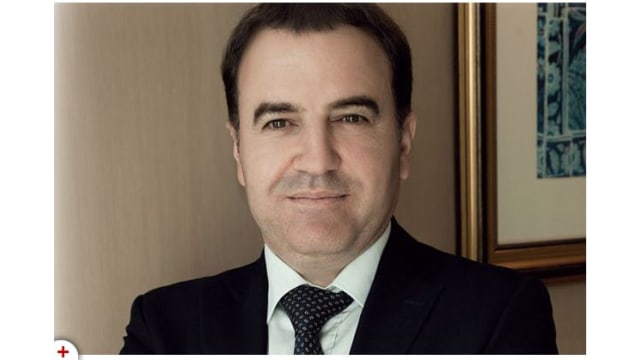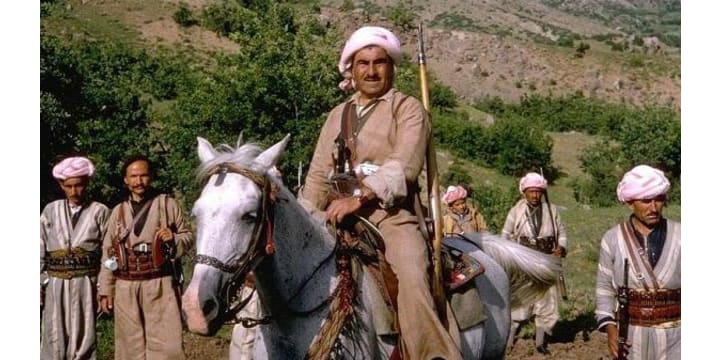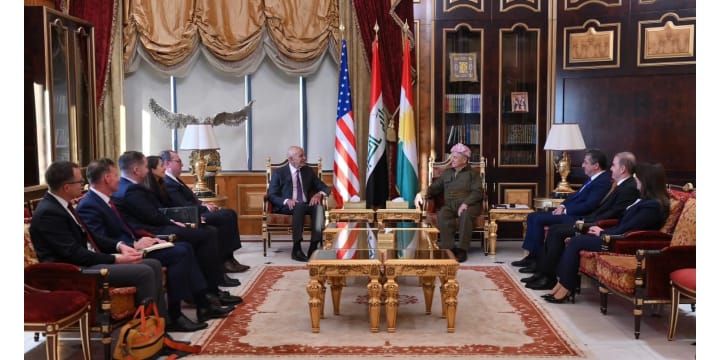
In an interview with The Turk Haber, Hemin Hawrami said the Kurdistan Region is doing its best to calm tensions and resolve problems between Baghdad and Ankara.
Hemin Hawrami, Head of Kurdistan Democratic Party’s Foreign Relations Office, highlighted the vision and the KDP positions in the current situation in the Middle East.
The town of Bashik has become a problem between Baghdad and Ankara. From the other side, the Kurdistan Region is going through a financial crisis. President Massed Barzani recently visited Baghdad and met with the Iraqi Prime Minister Haider al-Abadi with efforts to diffuse the rising tensions and situation between the province and the central government, and at the same time, to extend the presence of the Turkish troops in Iraq, the Iraqi government has thus far conveyed a strict attitude towards Turkey.
Translated/ by Sherko Habeb
Q: Let's start with the hot topic, the problem of Bashik, how do you see this crisis between Baghdad and Ankara?
Hawrami: We are not in any way trying to deepen the problem. We are calm regarding the crisis, as a region of Kurdistan, we are working with all our efforts to calm, and problem solve because there are many common issues between Iraq and Turkey, and also between the Kurdistan Region and Turkey, including security issues, the war against Daesh, the refugee crisis, the future of Iraq, the subject of energy, the joined Market, for these reasons, there are many factors that compel us to cooperate and coordinate, instead of fighting. We believe that the crisis between Iraq and Turkey is essential, and we also encourage them to cooperate and coordinate to resolve the crisis.
Q: To calm these escalations, what are the effective steps that can be taken by the Kurdistan Regional Government?
Hawrami: If the parties wish, and as I pointed out, we are ready for any steps as we live in a common area and are interconnected. Any threat to Iraq is direct threat to Turkey, and that threat to Turkey is a direct threat to Iraq and the Kurdistan Region to reinforce cooperation, we search for common grounds.
Q: Can we say that the Kurdistan Region during this crisis is not neutral?
Hawrami: No, I cannot define the situation in this way, for example the war with Dash is not of the Kurdistan Region alone, therefore, we deem it necessary and important for Iraq to have good relations with its neighbors. One of the most prominent problems with the Iraqi government is Iraq's foreign policy line, we do not want Iraq to be part of the existing polarization in the region, not a follower of any body, we do not want Iraq to be a part of the game in the region, to be against Turkey supporting Iran or vice versa, we see that acting accordingly to the interests of the Iraqi people and to have a balanced the foreign policy. Also, we wish that Turkey deal in the same style, and we wish to extend an olive branch and to end the crisis in the region but that requires the cooperation of Turkey – Iraq and the Kurdistan Region.
Q: It is clear that the process of the liberating Mosul is fast-approaching. What does the strategy need to uphold for the ultimate stability for Mosul?
Hawrami: To know the ultimate expression of true stability, my question is what are the expectations of the Mosul liberalization process? Is our goal the stability of Mosul? Or disharmony and to work against each other in order to get more gains? Our goal must be the elimination of all DAESH and their ideas in the region, so we must all focus on how to implement the process. Any military force will be involved in the process. What is the administrative system of the Center for Nineveh province, a city of Mosul to be established? What is the appropriate ground for the construction of the infrastructure of the conductor? How to return the displaced? Do we really can secure final stability? These are all important topics for the Kurdistan Region. Mosul is a multi-city, not like Ramadi and Fallujah, Tikrit including Sunni Arabs, Shiite Arabs, Turkmen, Sunnis and Shiite Turkmen, Yazidis, Kurds, Christians, Armenians, the question is how we can maintain this diversity?
There are three proposed scenarios, otherwise to return to Nineveh before Dash? My opinion is no, while the administration at that time was not comprehensive management, this was the reason for the fall of Mosul in a single day and led it to be controlled by Daesh. Timely, Maliki soldiers in Mosul when they heard only the name of Daesh they fled and surrendered the city, So we cannot go back to that scenario. The second scenario does not do anything and we have to leave it to fate and wait to see what will happen. This thing is not possible, and forces us to think about the third scenario. It is building a kind of administrative system, so that the Kurds and the Sunni Arabs and Yezidis and Turkmen and Christians feel they are conservative and can deliver their voices and the administration will be fair, and in fact, so far no body has to create a clear policy on non-military aspects in the process of Mosul, including a Sunni council who are living inside Mosul.
Q: Well, in your opinion, what are the best steps? Do you require Sunni forces and Peshmerga post-liberation?
Hawrami: There cannot be a process of liberating Mosul without the participation of the Peshmerga forces, because the north and east and west of this city are under the control of the Peshmerga. The Iraqi forces control only the south of the city, and from this perspective there must be coordination and cooperation between the Iraqi army and the Peshmerga forces, for your Information I mean the official Iraqi army and militias, I do not mean the popular crowd and others, and it should be the role of the Sunni as well.
Q: What is meant by “they have a role?” Do you mean the Sunni troops are supported by Turkey and have a positive role in liberating Mosul?
Hawrami: Yes, they definitely should be involved, but the question who are leading the Sunnis There are four different Sunni group, none of them have had military training, and do not have the power and influence in order to liberate the city of Mosul. So according to their abilities and their energies, they should be more involved in the framework of the Peshmerga and the Iraqi army, and the international coalition to participate in process of the liberation of the areas where they live, but as I pointed out the problem is not just liberation, the problem post liberation and to take on responsibilities in these areas. So, I hope not only Turkey but also Iran and Saudi Arabia not to look to Mosul as a geo-political a game.
Q: Turkey claims that it has implemented camps in Bashik with the knowledge of the Iraqi government, but Iraqi Prime Minister al-Abadi denies this strongly, in your opinion which one of them is right?
Hawrami: Many parties believe that the Kurdistan Region was the cause of the Turkish presence in Bashik, at a time when the Turkish army entered into these zones with the approval and request of the Iraqi Defence Minister Khaled al-Obeidi. If it were not so why did al-Obeidi visit this camp? And why was the Iraqi Deputy Prime Minister Osama al-Nujaifi asked during one of his visits to Turkey for help from this state? This problem is the problem of the Iraqi central government, we looked at this problem in an objective, not a personal mood, and we hope this liberation process in Mosul will not be a reason to deepen the problems, but we hope to be a cause for a greater regional cooperation.
Q: Well, are you optimistic?
Hawrami: In fact, no.
Q: Some believe that the Kurdistan Regional Government has asked Turkey to participate in the process of Mosul?
Hawrami: As I pointed out before, any point of either Turkey and others who want to participate in the war against Daesh, we welcome them. This is not a process announced by the Kurdistan Regional Government, it is an Iraqi process, the process of the international coalition against Daesh, Turkey, a NATO member, as well as America, why do NATO members not solve their problems? Why do they not coordinate with each other, we as a government, of the Kurdistan region do not wish to be a part to the problems, but we would like to be part of the solution of problems.
Q: Turkish Foreign Minister Mevlut Cavusoglu says ‘’Post Shi'ites in Mosul, the process does not bring peace with it," and also Human Rights are monitoring the organization in a statement announced expressed fears that the participation of any Shiite militias caused humanitarian disasters, and have a reason to spend a year, do you have the same fears?
Hawrami: Above all, we do not differentiate between militias, the popular crowd, and others, in general, all of them are not fighters with responsibility, and at the same time, although some of them participated in the liberation of Ramadi and Fallujah from the control of Daesh, at the same time the Iraqi government has recognized that some of them have committed heinous crimes against humanity. So we all must emphasize and insist on the participation and completion of this process by the official Iraqi forces. I mean the Iraqi army and the Peshmerga forces who are formally supported by the international coalition, I am not a military expert, but obviously the process of liberalization of Mosul is not a need to force an external army. Iraqi forces and the Peshmerga forces have the ability to lead the process but we do not have the intention to send peshmerga into Mosul, we do not want to talk about this. We are directing the process and opening gate. Sunnis in these areas must defend themselves and Iraqi forces are leading the process.
Q: Barzani visited Baghdad last week, in the midst of the region's relations with the Iraqi government, what do you suggest?
Hawrami: President Barzani's visit was for three reasons, first to eliminate mistrust between Erbil and Baghdad, where it was clear, and I think we managed to melt the ice. Secondly, to converse about the process of Mosul. Thirdly, to support the Prime Minister Haider al-Abadi, because some of the Shiite alliance pressured him too much, especially by al-Maliki, and also to talk about the future of bilateral relations between the two parties and also touched on the topics of energy, oil, and it was agreed to form technical committees for this purpose.
Q: You cannot pay the salaries of your staff, if the Iraqi government does not allocate 17% of the budget, what do you do?
Hawrami: In 2104 we agreed with the Iraqi government on the export of 550,000 barrels of oil daily by the Kurdistan Regional Government, and the Iraqi government to send 17% of the budget and also agreed with the Iraqi government to pay the Peshmerga salaries within the framework of the defence of Iraq's system, but according to the Iraqi government that we are not able to export 550,000 barrels per day, they broke the agreement, Alternatively we suggested that we define the annual rate of export and to check every three months, and we hope this formula will solve the problem of salaries.
Q: To end the budget crisis, what do you expect from Turkey?
Regarding our relations in the field of energy we offer our thanks to Turkey. Turkey for us is a very important partner, and we are working for the development of trade relations. We need more investment and Turkey leads in this sector. 80% of the construction sector in the province, administered by Turkish companies, more than 1,300 Turkish companies have business in Kurdistan, because of the financial crisis, the projects have been suspended, and if the Turkish bank with the help of these companies that operate in the region, we would and to give them the loan would be a great achievement.
Q: How do you view the process (Euphrates)?
Hawrami: We said at the outset that there is no such thing as a military solution in Syria, neither Bashar al-Assad cannot remain in power nor will the opposition have the capability and the ability to control Damascus, the capital, and as a result the citizen is the victim. the frozen Russian talks, the US replaced dissatisfaction, and also Turkey, Iran, Saudi Arabia and the United States, Russia and the European Union want to abandon the conflict and the search for a solution.
Q: What is your attitude about the founding of People's Democratic Part’s ongoing Kurdish entity in northern Syria?
Hawrami: Our position on (YPK) and (PYD) is a clear explanation by the announcement and as by the Turkish position, the (PYD) to end its relations with the Syrian regime and respect for the existence of other Kurdish groups. We tried very hard during the agreements in Erbil 1 and 2 for this purpose, and to send Peshmerga to Kobani to support them in the fight against Daesh, but because of PYD hostility to Turkey and the neglect of Kurdish and other groups, this was grounds for termination, and their approach to the policy is wrong. Now in Erbil, resides in 550,000 Kurds from Western Kurdistan because (PYD) applied a conscription policy which included forcing citizens to join the army and does not allow any activity for other groups in Western Kurdistan.
Q: Have you considered Barzani's visit to Iran important for the process of liberating Mosul?
Hawrami: Iran is our neighbour, we would like to make it clear to them that the Kurdistan Region is not a source of threat to anyone, and although it cannot be during one meeting one to solve all the problems.
Q: The US government has discussed sending military forces to Iraq, how do you see that?
Hawrami: According to my knowledge, it is for the purpose of training. They have sent 600 officers and soldiers. If for the same purpose, they intend to send more, we welcome it. In conclusion, I would say "steps to be taken after the expulsion Daesh of Mosul, if there is not a political organization, I am sure there will be more groups, more extreme than Al-Qaeda and Daesh show in the region.
http://www.haberturk.com/gundem/haber/1307652-turkiye-ve-irak-yonetimi-isterse-arabuluculuk-yapmaya-haziriz

